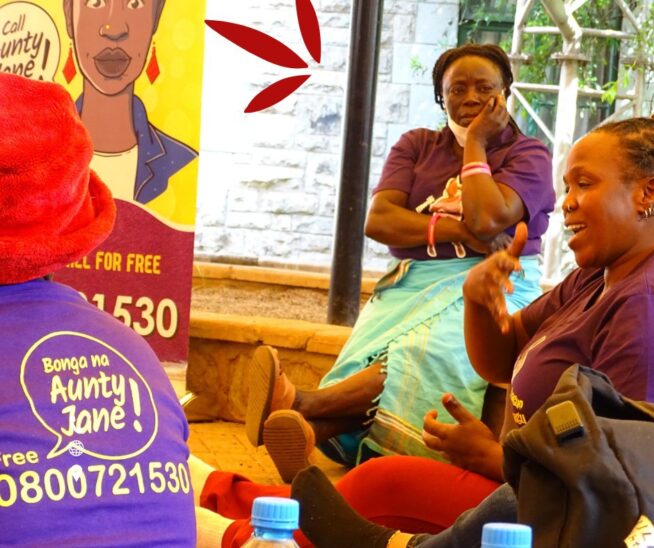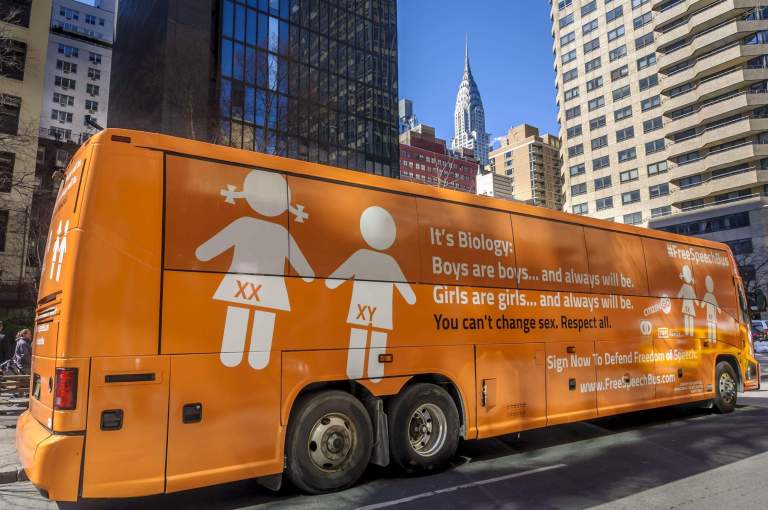How a community-run helpline is helping women access safe abortion advice in Kenya
In a leafy Nairobi suburb, the roaring traffic and human bustle of the city’s highways has receded into the distance. All that breaks the soft silence is the insistent ringing of the phone inside an office decorated with posters promoting sexual and reproductive rights. One poster explores consent: “is she shy, or too afraid to say stop?” Another exhorts the reader to “be true to you”, while one simply states “joy”.

Picking up that phone are the team behind Aunty Jane, a hotline which provides support for anyone with questions about their sexual and reproductive health, including how to access safe and legal abortion care.
“The hotline gets calls from teenage girls asking about menstruation, older women asking about the menopause, but the majority of calls are about accessing abortion,” explains Adhiambo, programme coordinator with an organisation that supports Aunty Jane. “The youngest caller we had was 11, the oldest was around 50. About half of our callers are in Nairobi, including in the informal settlements, while the other half are around the country, in more rural areas”.
Abortion is recognised as a constitutional right in Kenya. But legal recognition does not translate to easy access. According to Kenya’s constitution, abortion is not permitted unless a health professional believes there is need for emergency treatment, or the life or health of the mother is in danger, or if permitted by any other written law.
The legal status of abortion means that providing advice to women and girls on how to access safe and legal terminations is a tricky road to negotiate. But initiatives such as Aunty Jane have implemented feminist-led solutions to ensure women and girls get the information and care they need.
“One thing we acknowledge is that information provision and access is not limited under the law,” explains Adhiambo. “We are aware of the fact that access to information, including emergency healthcare and reproductive healthcare is a provision of our law. That forms the basis of the information we provide at the hotline, because of course, we don’t want to be in conflict with what the law provides for”.
To make sure women and girls know that Aunty Jane is on the end of the phone, the organisation adopts multiple strategies to raise awareness – from social media campaigns to sending community outreach workers into informal settlements to talk directly to women. “We use posters, stickers, Facebook and conversations,” says Adhiambo. Aunty Jane information can even be found in period pad packaging.

A typical call for a woman with an unwanted pregnancy is likely to cover the circumstances of the pregnancy. From there, Aunty Jane will assess what the caller understands about the legal provisions for abortion, and, if appropriate, make a referral to a medical professional who can provide care.
“The hotline has trained counsellors, not medical providers,” confirms an Aunty Jane hotline coordinator who preferred to remain anonymous.
Crucial to the solution that Aunty Jane offers, says senior programmes manager, Warindi, “is assessing and providing information so that women can make the right decision for themselves”.
“It’s about a woman’s choice, and our counsellors are trained to support that,” she adds.
The need for the feminist solutions offered by Aunty Jane could not be more urgent in Kenya, where nearly seven women a day die due to unsafe abortion. In Nakuru, a small rural city that sits on a lake where flamingos and buffalo flock, a young student describes women in her university drinking disinfectant to induce miscarriage. Aunty Jane hears stories of women inserting objects into their vagina to end an unwanted pregnancy.
Kenya has one of the highest rates of early pregnancy in the world. Teenage pregnancy is associated with girls being forced to drop out of school, where they become more vulnerable to gender-based violence, poverty and exploitation.
The youngest caller we had was 11, the oldest was around 50.Adhiambo, Aunty Jane
Just over 200 miles from Nairobi, in the rural city of Kisumu, and the risks of teenage pregnancy are high on the agenda for the African Youth Action Network (AYAN). The organisation offers support and advice to young people across a whole range of issues, including reproductive and sexual health, and sexuality.
“We get questions from young girls about, where can I access contraception? Where can I access abortion? Where can I access post-abortion services?” Betram Odhiambo, at AYAN. As with Aunty Jane, any advice the team provides sits within the law.
One of the innovations that Odhiambo points callers to is an app that helps them to access safe and accurate information about contraception and sexual health. The Hesperian Health Guides counter disinformation shared by anti-abortion, anti-LGBTIQ groups such as World Youth Alliance, which launched a fertility app in the region.
“On the app they can get the comprehensive information about how they can access abortion services, to what is available for family planning,” says Odhiambo. “We’ve also been trained to refer callers to private facilities that offer these services, and last year we helped 17 girls to access the safe and legal abortion care they were entitled to”.
For Odhiambo, one of AYAN’s most important roles is facilitating conversations about contraception, abortion, and wider sexual rights. “Over the past few years, we have had over 250 community conversations that are structured clearly on issues around sexual reproductive health and rights,” he says.
Part of those conversations focused on tackling gender stereotypes that prevent women accessing their bodily autonomy and wider human rights.
“We looked at how we involve men in supporting women,” he explains. “We broke down the issues of reproductive rights for men, so they can understand what reproductive rights are all about. Our argument is that men need to understand that if a woman gets pregnant, it’s her right to decide if she doesn’t want to carry a baby. That even the use of contraceptives is the decision of the woman”.

Both Aunty Jane and AYAN have suffered backlash from anti-abortion groups and individuals determined to repress information about sexual and reproductive healthcare.
“We are being attacked every day,” admits Odhiambo. “On social media platforms. People come to disrupt our events”.
The attacks on Aunty Jane have even involved fake calls to the hotline, something which the team is well versed in dealing with.
“Our service providers are trained, even on security,” explains a co-ordinator at Aunty Jane. “We know that prank callers will often be very quick to try and probe for information. When we take a call, we put the caller through a process of counselling and assessment, before seeing if we can make a referral. At that point, people calling with a fake pregnancy tend to give up!”
Smart solutions, but pressures remain. Pro-abortion groups also feel there was a missed opportunity in 2022 to promote access to safe abortion in the government’s new reproductive health policy. Meanwhile, a proposed family protection bill seeks to follow neighbouring Uganda’s lead by introducing greater restrictions on LGBTIQ+ rights.
Further, the overruling of Roe v Wade in the US has had implications in Kenya, with anti-abortion groups feeling emboldened by the Supreme Court decision.
“Anti gender groups are lumping abortion and LGBTIQ rights together and there’s a whole campaign now around African values and saying all these things that are against our values,” says a worker at Aunty Jane. “People have been saying since Roe v Wade that if the West is rethinking abortion laws, we should not have it here either. There’s a lot of involvement, if I can call it that, from groups that were also campaigning against Roe v Wade in the US”.
Despite all of this, thanks to Aunty Jane and organisations such as AYAN, more and more people in Kenya are able to overcome barriers and access what can be life-saving information about their reproductive health.
Images: Aunty Jane
Some names have been changed for security reasons.
This story is part of a year-long solutions journalism project between Greater Govanhill Magazine and The Ferret.
Mind the health gap will collaborate with local communities to report on the way inequality leads to health disadvantages and shorter lives. But it also aims to look at the impact across Scotland, and to take inspiration from across the world, including the global south.
We consulted with local agencies in Govanhill, health experts across Scotland and surveyed Ferret and Greater Govanhill readers online. They highlighted the importance of covering health topics that impact on women.
This project is funded by the European Journalism Centre, through the Solutions Journalism Accelerator and is a fund supported by the Bill & Melinda Gates Foundation.



Add Comment